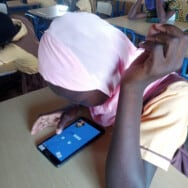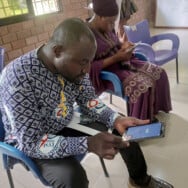Boosting English Reading Skills with a Google App in Ghana
May 30th, 2023 | News
Building off the success and learnings of the five-year Strategic Approaches to Girls’ Education (STAGE) project in Ghana, World Education is piloting a program this summer to support former out-of-school girls in strengthening their English language proficiency using Google’s Read Along app.
For girls in Northern Ghana, reading stories on a tablet that provides real-time feedback to improve their English comprehension and fluency is a new experience for many children between 13 and 17 years old. Each day, they practice for 15 minutes outside of school hours, supported by a trained Mentor Teacher. Girls are concentrated and motivated while the Google Read Along app provides stories aligned to their reading levels.
For World Education and our partners piloting this program, it’s immediately clear that this is an exciting and motivating activity. Observing these girls when they participated in the STAGE program, we saw that many of them face challenges transitioning to school because the language of instruction in grade 3 and higher is English. This is not a new phenomenon. Many children who went through similar Complementary Basic Education programs are facing these issues, and there has not been an effective solution yet. This is even more challenging if we consider the lack of appropriate reading materials in schools and households.
In collaboration with Google, we’re using the free Read Along application to assess its effectiveness in meeting these challenges. The Read Along app has more than 1,000 stories in 4 readability levels in multiple languages. The app allows children to play decoding and word recognition games, as well as read stories. A great advantage of the Read Along app is that it works completely offline and has no distracting ads or in-app purchases. Leveraging Google’s text-to-speech recognition and artificial intelligence, children practice reading while an online reading buddy ‘Diya’ provides immediate feedback and models fluency and pronunciation where needed. Meanwhile, children collect rewards when they have completed their daily exercises and progress to more difficult books.

Girls are excited to build their skills as they interact with the application. One girl stated,
…this is the first time I am reading A for Apple stories and interestingly using a tablet. It is exciting as Diya guides me to read. The most fascinating aspect of reading is when I get the opportunity to spell words that I have read in a form of a game. My friends and I keep discussing the stories that we read on our way home without noticing the distances we have walked.”
We’re working with Ghana Education Services to build the capacity of Mentor Teachers and Head Teachers of 3 schools in the Tolon district to implement the program. Tablets have been provided with preloaded books and all involved have been trained to set up a daily schedule and manage the required hardware and software.

Two weeks into the project, a teacher at one of the schools noted,
I believe this project will achieve higher fluency in reading for most of the girls, and a few will be able to read word by word in a sentence or paragraph form.”
Teachers even report that school attendance has increased because girls and parents want to be part of this program and enjoy the activities with the app. As many more people in Ghana get access to smartphones, the use of the app has the potential to impact reading levels and habits.
To measure the impact of the pilot, we have designed a study to compare reading gains in the three program schools with four similar control schools. We conducted a baseline study using an Early Grade Reading Assessment (EGRA) and preliminary results confirm low proficiency levels in reading English. Children in grade 5 of both program and control schools read on average 11 words per minute in the Oral Reading Fluency subtask. They are also facing challenges in the Listening Comprehension and Reading Comprehension subtasks with the vast majority of girls not being able to respond to a single comprehension question. A complete baseline EGRA study report will be made available as the pilot progresses.
Together with Ghana Education Services and other partners, we’re conducting bi-weekly monitoring visits to the schools and plan to continue to share more learnings from this pilot as it progresses. An end line evaluation will take place in July to measure impact and inform the next steps for a potential scale-up to other schools and regions.
Sign up for our newsletter to receive project updates. If you have questions about this pilot or want to partner with us, reach out to wvandewaal@worlded.org.
World Education strives to build lasting relationships with partners across diverse geographic regions and technical sectors to produce better education outcomes for all.